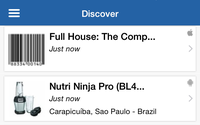 There’s still a lot of mobile scanning going on.
There’s still a lot of mobile scanning going on.
While
talk about QR codes has moved to the back burner, being replaced by the likes of beacons, augmented reality and mobile payments, it doesn’t mean mobile code scanning has
gone away.
I happened across the latest quarterly Mobile Trend Report by ScanLife, one of the very early QR code pioneers, and it has some interesting insights and scanning tidbits.
Almost half (47%) of scans came from those between 25 and 44 years old while 38% came from those 45 and older.
Males are responsible for the majority (59%) of scans compared to females at
41%, based on 22 million scans.
The most active time of day for product scanning is between 6 p.m. and 7 p.m. and the average person who scans does it 4 times.
By operating system,
Apple edges out Android devices, 54% to 43%.
advertisement
advertisement
But it gets more interesting. Based on items scanned, ScanLife identified the interests of iOS and Android users.
Here are the top
interests of people who scanned with an Apple device:
- Value shoppers
- Casual and social gamers
- Music lovers
- Health and fitness enthusiasts
- Photo
and video enthusiasts
Here are the top interests of people who scanned with an Andorid device:
- Value shoppers
- Catalog shoppers
- Social
influencers
- Casual and social gamers
- Entertainment enthusiasts
The top interests based on mobile engagement were technology and gadgets, food and drink and
media.
Most scanning apps now can scan both QR and UPC codes and it looks like consumers are doing both. The largest category of both QR and UPC code scanning was groceries.
Here are
the top categories for UPC code scans:
- Grocery
- Book
- Health and beauty
- Consumer electronics
- Toys
For QR codes scanning, consumers
appear to be looking for content, which seems logical. Here are the top pieces of content delivered via QR code scanning:
- Product info
- Video
- E-commerce
- App download
- CRM
The leading websites from scanning were SeaWorld, Coca-Cola and HP. Go figure.
Though some categories are scanned more than others, it looks like
scanning is permeating pretty much everything a consumer may consider purchasing.